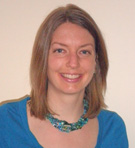Stephanie Ewert
Graduation Year: 2004
Major:
Why did you choose Sociology?
While taking Intro to Sociology to fulfill a general education requirement, I realized I enjoyed reading the textbook and left every class continuing to think and talk about the material. The ideas and theories we discussed in the various Sociology courses helped me to process the experiences I had living and traveling in developing countries while growing up.
Which courses made the most impression on you?
The problem sets and projects in the Statistics and Research Methods courses helped me realize that I was drawn to quantitative methods. The guest speakers in the Urban Sociology class developed my interest in studying inequality within the United States.
How did that affect your career choice?
These courses directly affected my career choice since they provided the foundation of sociological research needed for grad school and my eventual career. One of the books I read in Intro to Sociology piqued my interest in educational inequality in inner cities, and that interest led to my research focus on education during grad school and my pursuit of education research jobs upon graduation.
Which professors impacted you?
I can honestly say that all the professors in the department impacted me. , my advisor, and , whom I TA’d for, both had a particularly huge impact. They encouraged me to go to grad school and stayed in touch with me throughout my grad school years. I know they both prayed for me on the days I took my qualifying exams and defended my dissertation. As I finished grad school, I returned to Wheaton for a visit and Dr. Mathisen and Dr. Nieves took me out to lunch so I could discuss my career options. I was wrestling with whether to pursue academic jobs or research positions, and they listened to me and gave me wise counsel. I am incredibly grateful to both for their encouragement, support, and wisdom over the years.
How and why did you choose to follow your path beyond graduation?
After taking the Urban Sociology course, which highlighted the great need in U.S. cities, I knew I wanted to spend some time working in an inner city. Therefore, after Wheaton graduation, I spent a year as an AmeriCorps VISTA >> volunteer working in a low-income school in Phoenix. This work solidified my interest in educational inequality and also reinforced my desire to go to grad school in sociology where I would develop tools to address inequality at a macro level. After completing my Ph.D., I pursued quantitative research jobs focused on education.
What are you doing now?
I am a survey statistician at the U.S. Census Bureau >> where I focus on education research. Part of my job involves data production—writing survey questions, reviewing data quality, and preparing data to be released for public use. Another part of my job involves research related to educational attainment, the economic pay-off to educational attainment and field of study, and patterns of school enrollment. With this research, I write government reports, conference papers, and working papers.
What advice would you give to a potential major?
Take the time to get to know the professors in the department. They truly invest in students and have a wealth of knowledge to share. Also, think critically about the material you study in your courses. Sociology will offer you a framework through which to process your life experiences and will lay the foundation for a variety of careers.
About me:
I am an avid triathlete and compete in numerous triathlons every year, traveling as far as New Zealand to race. When I’m not working or training for triathlons, I like to travel internationally or explore my backyard in Washington, DC.
